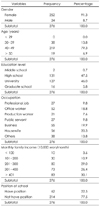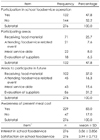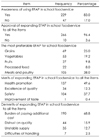Abstract
The purpose of this study was to investigate parent's perception of a middle school foodservice in Masan city, Korea that uses environmentally friendly agricultural products (EFAP). From May 29, 2009 to July 11, 2009, questionnaires were distributed to 350 parents of middle schools located in Masan city. A total of 295 responded and 276 (response rate, 78.9%) were used for the final analysis after excluding improperly completed questionnaires. First, 47.8% of the parents responded that they had participated in the school foodservice operation (receiving food, attending foodservice-related events, working as a meal service aid, evaluating suppliers). Receiving food (53.7%) accounted for the greatest proportion in the participating area. Second, most subjects (83.0%) responded that they were aware of the use of EFAP. Additionally, 96.4% of the subject approved expanding the use of EFAP for all items. Third, their degree of interest in the school foodservice was 3.86, and satisfaction with the school foodservice was 3.94 based on a 5-point Likert scale. The overall satisfaction on the quality of EFAP used in the school foodservice was 3.68 based on a 5-point Likert scale. Fourth, awareness that the school used EFAP in the foodservice by the parents who participated in school foodservice operations was higher than that of parents who did not participate. Satisfaction (4.10) with the school foodservice by parents who participated in school foodservice operations was significantly higher than that (3.79) of parents who did not participate (p < 0.001). In conclusion, parent's participation in school foodservice operations should increase to improve the quality of the school foodservice and improve communication between parents and the school.
Figures and Tables
Table 6
Comparison of parents' perception on school foodservice according to participation and position of school (n (%))

Table 7
Comparison of parents' perception on usage of EFAP in school foodservice according to participation and position of school (n (%))

References
1. Yang IS, Cha JA, Shin SY, Park MK. Foodservice management. 2009. 2nd ed. Paju: Kyomunsa;39–40.
2. Gyeongsangnam-do Office of Education. The scheme of fundamental operation of school foodservice. 2010. Changwon:
3. Ministry of Education & Human Resources Development. Guideline of school foodservice law. 2007. Seoul:
4. Masan Office of Education. 2006 Plan for supporting of food purchasing in foodservice. 2009. Masan:
5. Heo SW. Development process and strategies for school lunch program using environmentally friendly agri-products. Korean J Org Agric. 2006. 14(1):41–53.
6. Sin MS. An awareness of environment-friendly farm produce in parents and nutrition teachers [MS thesis]. 2008. Chuncheon: Kangwon University.
7. Baek MS. A survey of parents' satisfaction for school foodservice through school monitoring [MS thesis]. 2008. Seongnam: Kyungwon University.
8. Baek M, Lee Y, Oh YJ. A study on parents' satisfaction with school foodservice by foodservice monitoring participation. J Korean Diet Assoc. 2009. 15(3):253–261.
9. Lee YS. Analysis on the status and satisfaction of the sustainable agriculture products being used for school foodservice (focused on elementary school in Daejeon) [MS thesis]. 2008. Gongju: Kongju National University.
10. Lee YS, Park MJ. Parental perception and satisfaction with environment-friendly agricultural products used for school foodservice in elementary schools in Daejeon. Korean J Food Cult. 2008. 23(6):737–747.
11. Kim NR. A study on the degree of parents' recognition and satisfaction with eco-friendly agricultural products in Cheongju area [MS thesis]. 2009. Daejeon: Chungnam National University.
12. Kim NR, Cho YS, Kim SA. Satisfaction and recognition level of environment-friendly agricultural products in Cheongju area. Korean J Community Nutr. 2011. 16(1):75–85.

13. Kwak MJ. The parents' recognition about environmental-friendly farm product between applied school and non-applied school & the comparison of opinion regarding expansion of using it at school foodservice [MS thesis]. 2008. Cheongju: Chungbuk National University.
14. Bae HJ. A comparison of opinions between dietitians and students' parents on school foodservice monitoring [MS thesis]. 2007. Daegu: Daegu University.
15. Bae HJ, Bae HJ. Survey on the performance practices and the opinions on school foodservice monitoring by dietitians and students' parents in Ulsan area. J Korean Soc Food Sci Nutr. 2009. 38(7):862–869.

16. Lee HJ. A study on perception and satisfaction of students and parents with school lunch using eco-friendly agricultural products [MS thesis]. 2009. Busan: Silla University.
17. Park HJ. Research on parent awareness on the application of environmentally friendly agricultural products for school lunches in Jangseong-gun [MS thesis]. 2009. Gwangju: Chosun University.
18. Lee MH. A study on the change of parent's perception about school food services after their participation [MS thesis]. 2005. Jukjeon: Dankook University.
19. Kim DH. A study on the satisfaction and understanding of parent's about school foodservice through participation [MS thesis]. 2007. Daejeon: Chungnam National University.
20. Jang SH. A research on parents' satisfaction with school lunch through participation in school lunch monitoring [MS thesis]. 2009. Busan: Silla University.
21. Park JY. A study on use status of and satisfaction with environmental-friendly agricultural products by female consumers in Jeju Area-Focused on consumers using specialty shops for environmental-friendly agricultural products- [MS thesis]. 2006. Jeju: Jeju National University.
22. Choi JW. Degree of satisfaction and recognition for environment friendly agricultural products of elementary school teachers and students in Iksan [MS thesis]. 2007. Iksan: Wonkwang University.
23. Jang SM. A survey of school nutritionists use and satisfaction of environment-friendly farm products-focused on Seoul and Gyeonggi-do- [MS thesis]. 2007. Suwon: The University of Suwon.
24. Kim KS. Factors influencing purchasing status of environment-friendly agricultural products at school food service in Gyeonggi-do [MS thesis]. 2008. Seoul: Hanyang University.
25. Lee YS, Lee NO, Ko SH. A survey on use of environment-friendly agricultural products for school food service by dietitians in Chungnam province. Korean J Community Nutr. 2009. 14(5):556–564.
26. Chang HS, Lee MJ. The perception for management of school foodservice using of environmentally friendly agricultural products of elementary school children's mothers in Gunsan. Korean J Community Nutr. 2008. 13(6):867–878.
27. Kim EM, Jeong MK. The survey of children's and their parents’ satisfaction for school lunch program in elementary school. J Korean Soc Food Sci Nutr. 2006. 35(6):809–814.
28. Kim KR. Research on the utilization, recognition, and satisfaction of environment-friendly agricultural products in school meals (Based on the elementary schools in the Busan district) [MS thesis]. 2007. Busan: Kosin University.
29. Kim YH. Study on usage and perception of eco-friendly agricultural products by school food nutrition teachers in Chungnam area [MS thesis]. 2010. Daejeon: Chungnam National University.
30. Kim MO. A study on the awareness and satisfaction of environment-friendly agricultural products by the nutrition teachers in Chonbuk area [MS thesis]. 2010. Jeonju: Chonbuk National University.
31. Jun MA. Perception in environmentally friendly agricultural products of school nutrition teacher (dietitians) working in Gyeongnam Area [MS thesis]. 2011. Changwon: Changwon National University.
32. Lee JH. A research on recognition and actual use of eco-friendly agricultural products by dieticians in charge of school lunch in south Gyeongsang province [MS thesis]. 2009. Busan: Silla University.
33. Choi HY. A study on the current use and satisfaction in environmentally-friendly farm products in school feeding for secondary and high schools in Gwanju [MS thesis]. 2008. Gwangju: Chosun University.




 PDF
PDF ePub
ePub Citation
Citation Print
Print









 XML Download
XML Download